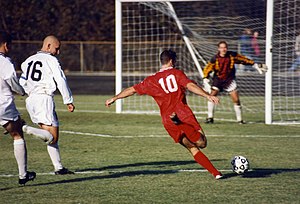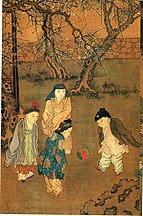FOOTBALL
(Soocer)
Association football, more commonly known as simply football or soccer,[a] is a team sport played with a spherical ball between two teams of 11 players. It is played by approximately 250 million players in over 200 countries and dependencies, making it the world's most popular sport. The game is played on a rectangular field called a pitch with a goal at each end. The object of the game is to score more goals than the opposition by moving the ball beyond the goal line into the opposing goal, usually within a time frame of 90 or more minutes.
Football is played in accordance with a set of rules known as the Laws of the Game. The ball is 68–70 cm (27–28 in) in circumference and known as the football. The two teams compete to get the ball into the other team's goal (between the posts and under the bar), thereby scoring a goal. Players are not allowed to touch the ball with hands or arms while it is in play, except for the goalkeepers within the penalty area. Players may use any other part of their body to strike or pass the ball, and mainly use their feet. The team that scores more goals at the end of the game is the winner; if both teams have scored an equal number of goals, either a draw is declared or the game goes into extra time or a penalty shootout, depending on the format of the competition. Each team is led by a captain who has only one official responsibility as mandated by the Laws of the Game: to represent their team in the coin toss prior to kick-off or penalty kicks.[4]
Football is governed internationally by the International Federation of Association Football (FIFA; French: Fédération Internationale de Football Association), which organises World Cups for men and women every four years.[5] The men's FIFA World Cup has taken place every four years since 1930, with the exception of 1942 and 1946 tournaments, which were cancelled due to World War II. Approximately 190–200 national teams compete in qualifying tournaments within the scope of continental confederations for a place in the finals. The finals tournament is held every four years and involves 32 national teams competing over four weeks.[b] It is the most prestigious men's football tournament in the world, and the most widely viewed and followed sporting event in the world, exceeding the Olympic Games. Similarly, the FIFA Women's World Cup has been played every four years since 1991, though football has been played by women since it has existed. A record-breaking 1.12 billion viewers watched the 2019 FIFA Women's World Cup in France.[6]
The most prestigious competitions in European club football are the UEFA Champions League and UEFA Women's Champions League, which attract an extensive television audience throughout the world. The final of the men's tournament has been, in recent years, the most-watched annual sporting event in the world.[7] The top five European men's leagues are the Premier League (England), La Liga (Spain), Bundesliga (Germany), Serie A (Italy), and Ligue 1 (France). Attracting most of the world's best players, each of the leagues has a total wage cost in excess of £600 million/€763 million/US$1.185 billion.[8]
Name
Football is one of a family of football codes, which emerged from various ball games played worldwide since antiquity. The modern game traces its origins to 1863 when the Laws of the Game were originally codified in England by The Football Association (FA). The name association football was a retronym coined to distinguish the game from the other forms of football played at the time, specifically rugby football. The first written "reference to the inflated ball used in the game" was in the mid-14th century: "Þe heued fro þe body went, Als it were a foteballe."[9] The Online Etymology Dictionary states that the "rules of the game" were made in 1848, before the "split off in 1863".[10]
The term soccer comes from Oxford "-er" slang, which was prevalent at Oxford University in England from about 1875, and is thought to have been borrowed from the slang of Rugby School. The slang also gave rise to rugger for Rugby football, fiver and tenner for a five pound and ten pound note, and the now archaic footer for association football. [11] The word soccer (which arrived at its final form in 1895) was first recorded in 1889 in the earlier form of socca.[12]
Within the English-speaking world, association football is now usually called "football" in the United Kingdom, whereas people usually call it "soccer" in countries where other codes of football are prevalent, such as Australia,[13] Canada, South Africa and the United States. A notable exception is New Zealand, where in the first two decades of the 21st century, under the influence of international television, "football" has been gaining prevalence, despite the dominance of other codes of football, namely rugby union, and rugby league.[14]
History
Kicking ball games arose independently multiple times across multiple cultures. The Chinese competitive game cuju (蹴鞠, literally "kick ball") resembles modern association football.[16] Cuju players could use any part of the body apart from hands and the intent was kicking a ball through an opening into a net. During the Han Dynasty (206 BCE – 220 CE), cuju games were standardised and rules were established.[17]
Phaininda and episkyros were Greek ball games.[18][19] An image of an episkyros player depicted in low relief on a vase at the National Archaeological Museum of Athens[15] appears on the UEFA European Championship trophy.[20] Athenaeus, writing in 228 CE, referenced the Roman ball game harpastum. Phaininda, episkyros and harpastum were played involving hands and violence. They all appear to have resembled rugby football, wrestling and volleyball more than what is recognizable as modern football.[17][21][22][23][24][25] As with pre-codified "mob football", the antecedent of all modern football codes, these three games involved more handling the ball than kicking.[26][27]
Other games included kemari in Japan and chuk-guk in Korea.[28][29] In North America, pasuckuakohowog was a ball game played by the Algonquians; it was described as "almost identical to the kind of folk football being played in Europe at the same time, in which the ball was kicked through goals".[30]
Association football in itself does not have a classical history.[20] Notwithstanding any similarities to other ball games played around the world FIFA has recognised that no historical connection exists with any game played in antiquity outside Europe.[31] The modern rules of association football are based on the mid-19th century efforts to standardise the widely varying forms of football played in the public schools of England. The history of football in England dates back to at least the eighth century CE.[32]
The Cambridge rules, first drawn up at Cambridge University in 1848, were particularly influential in the development of subsequent codes, including association football. The Cambridge rules were written at Trinity College, Cambridge, at a meeting attended by representatives from Eton, Harrow, Rugby, Winchester and Shrewsbury schools. They were not universally adopted. During the 1850s, many clubs unconnected to schools or universities were formed throughout the English-speaking world, to play various forms of football. Some came up with their own distinct codes of rules, most notably the Sheffield Football Club, formed by former public school pupils in 1857,[33] which led to formation of a Sheffield FA in 1867. In 1862, John Charles Thring of Uppingham School also devised an influential set of rules.[34]
These ongoing efforts contributed to the formation of The Football Association (The FA) in 1863, which first met on the morning of 26 October 1863 at the Freemasons' Tavern in Great Queen Street, London.[35] The only school to be represented on this occasion was Charterhouse. The Freemasons' Tavern was the setting for five more meetings between October and December, which eventually produced the first comprehensive set of rules. At the final meeting, the first FA treasurer, the representative from Blackheath, withdrew his club from the FA over the removal of two draft rules at the previous meeting: the first allowed for running with the ball in hand; the second for obstructing such a run by hacking (kicking an opponent in the shins), tripping and holding. Other English rugby clubs followed this lead and did not join the FA and instead in 1871 formed the Rugby Football Union. The eleven remaining clubs, under the charge of Ebenezer Cobb Morley, went on to ratify the original thirteen laws of the game.[35] These rules included handling of the ball by "marks" and the lack of a crossbar, rules which made it remarkably similar to Victorian rules football being developed at that time in Australia. The Sheffield FA played by its own rules until the 1870s with the FA absorbing some of its rules until there was little difference between the games.[36]
The world's oldest football competition is the FA Cup, which was founded by the footballer and cricketer Charles W. Alcock, and has been contested by English teams since 1872. The first official international football match also took place in 1872, between Scotland and England in Glasgow, again at the instigation of C.W. Alcock. England is also home to the world's first football league, which was founded in Birmingham in 1888 by Aston Villa director William McGregor.[37] The original format contained 12 clubs from the Midlands and Northern England.[38]
The laws of the game are determined by the International Football Association Board (IFAB).[39] The board was formed in 1886[40] after a meeting in Manchester of The Football Association, the Scottish Football Association, the Football Association of Wales, and the Irish Football Association. FIFA, the international football body, was formed in Paris in 1904 and declared that they would adhere to Laws of the Game of the Football Association.[41] The growing popularity of the international game led to the admittance of FIFA representatives to the International Football Association Board in 1913. The board consists of four representatives from FIFA and one representative from each of the four British associations.[42]
Football is played at a professional level all over the world. Millions of people regularly go to football stadiums to follow their favourite teams,[43] while billions more watch the game on television or on the internet.[44][45] A very large number of people also play football at an amateur level. According to a survey conducted by FIFA published in 2001, over 240 million people from more than 200 countries regularly play football.[46] Football has the highest global television audience in sport.[47]
In many parts of the world football evokes great passions and plays an important role in the life of individual fans, local communities, and even nations. R. Kapuscinski says that Europeans who are polite, modest, or humble fall easily into rage when playing or watching football games.[48] The Ivory Coast national football team helped secure a truce to the nation's civil war in 2006[49] and it helped further reduce tensions between government and rebel forces in 2007 by playing a match in the rebel capital of Bouaké, an occasion that brought both armies together peacefully for the first time.[50] By contrast, football is widely considered to have been the final proximate cause for the Football War in June 1969 between El Salvador and Honduras.[51] The sport also exacerbated tensions at the beginning of the Croatian Independence War of the 1990s, when a match between Dinamo Zagreb and Red Star Belgrade degenerated into rioting in May 1990.





Comments
Post a Comment
Share your feedback here